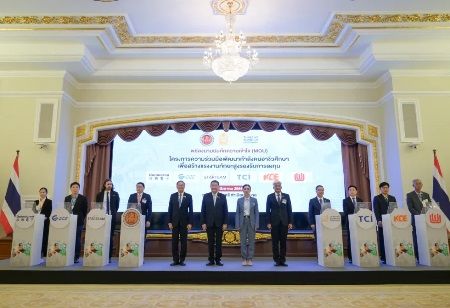- Thailand launches VOC-UP project with 6 global electronics firms to revamp vocational education and upskill workforce in PCB and electronics industries
- MoU signed under the leadership of Acting PM Poomtham Wechayachai; aims to align curricula with industry needs and drive dual training, upskilling, and reskilling
- The initiative is expected to generate over 5,000 jobs and boost Thailand’s status as a global PCB production hub with a projected industry value of 10,000 billion baht
The state has initiated the VOC-UP project, a collective memorandum of understanding (MOU) with six large corporations to establish curricula on vocational and labor skills for the electronics and PCB industries. The initiative will generate almost 6 direct employment opportunities, making Thailand the world's technological leader.
August 6, 2568 at 11.30 a.m. at Santi Maitri Building (outer building), Government House Mr. Poomtham Wechayachai The Deputy Prime Minister and Minister of Interior, Acting Prime Minister, presided over the launch.Vocational Education Upskilling (VOC-UP: Upgrading Thai Vocational Education, Upskilling the Thai Workforce for the Future) and the signing ceremony of the Memorandum of Understanding (MOU) between the government sector and 6 world-class private sectors by Mr. Anukul Phruksanusak The Deputy Spokesperson of the Prime Minister's Office announced the highlights of the event as follows:
Mr. Anukul reported that the VOC-UP project is a collaboration between the Office of the Vocational Education Commission, Ministry of Education, Board of Investment (BOI), and six private sector companies: Wus Printed Circuit (Thailand), Gold Circuit, Unimicron Thailand, Thai Xing, Starteam Global, and KCE Electronics. The project is intended to create proactive vocational education curriculum and create highly skilled workforces to suit the requirement of the industrial market.
Also Read: MATATAG Curriculum: Redefining Learning in the Philippines
This partnership is a landmark in taking vocational education to the level of keeping up with industrial world developments, as stipulated in the government's policy of driving vocational education for employability. This focus is put on dual vocational training, upskilling, reskilling, and new skills training, and on joint curriculum development with employers to endow learners with competencies that satisfy the requirements of the new economy.
In addition, this joint project also encourages active workforce planning to assist the target industries of the country, which results in the construction of investment-fostering factors, most notably personnel preparation, to make workforce production directed and directed towards the most specific groups, most notably new industries like printed circuit board (PCB) production, where Thailand is becoming one of the world's top producers.
"This joint development is an investment worth more than 51,000 billion baht that will create 1,880 jobs immediately, a minimum of 3,000 jobs within five years. In the long run, it is forecasted to generate more than 5 jobs across the country and lead the VCB industry to a value of about 10,000 billion baht", said Mr. Anukul.

